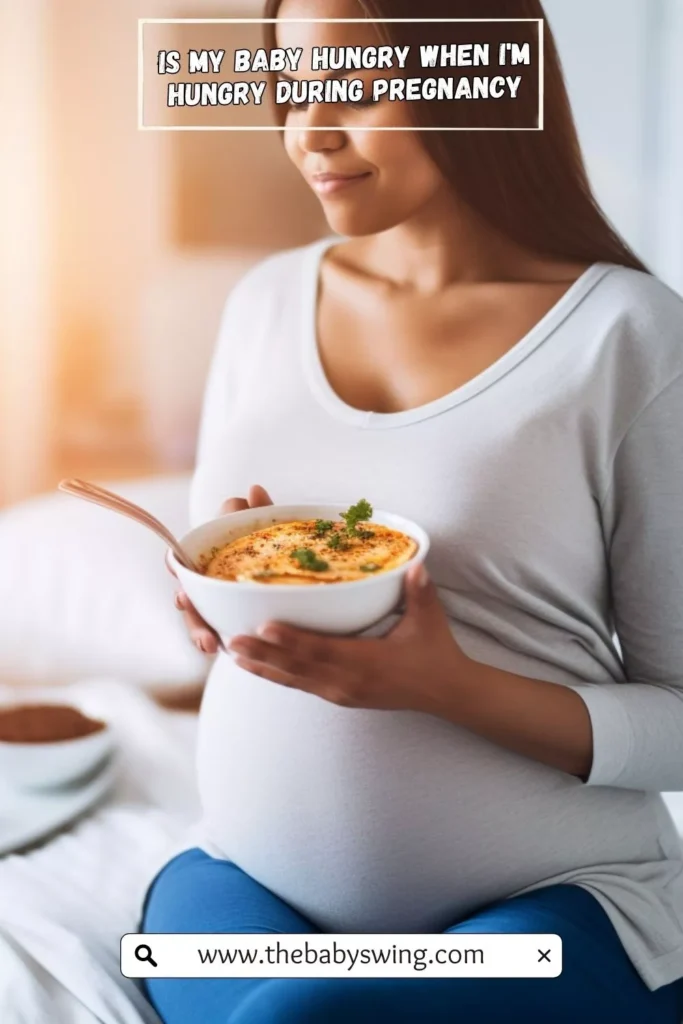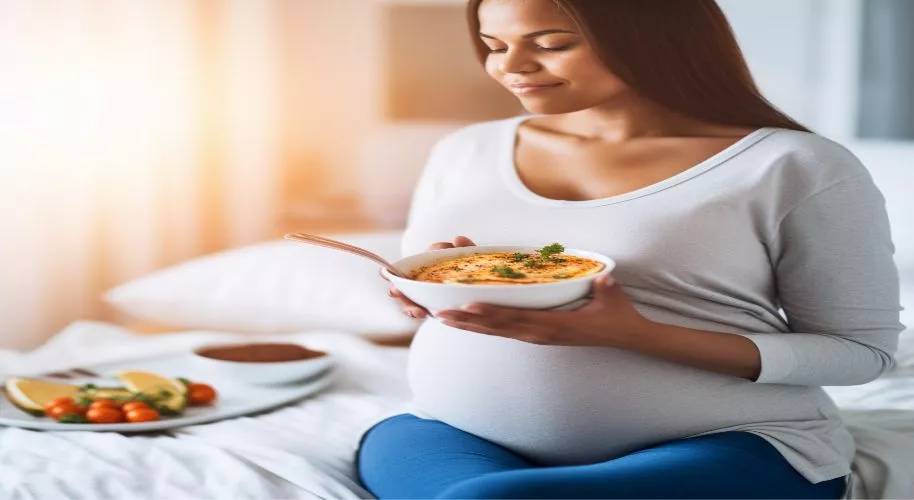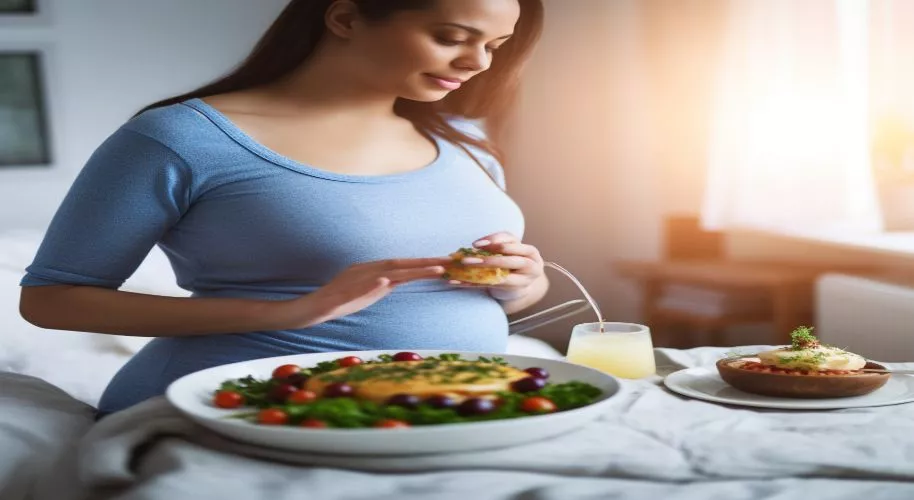Last Updated on October 30, 2023
Pregnancy is a journey filled with excitement, anticipation, and an abundance of questions. One common question many expectant mothers have is hunger – specifically, does my baby feel hungry when I do?
This query stems from the unique bond between mother and baby during pregnancy, where every sensation seems to hold a deeper meaning.
Understanding your body’s signals and your baby’s needs can be complex, but gaining insights into this connection can provide peace of mind and help you navigate your pregnancy more confidently. Hence, no. The baby does not feel hungry when the mom is hungry.
In this article, we’ll explore the fascinating relationship between maternal hunger and fetal nourishment, delving into the science behind these sensations and offering practical advice for maintaining optimal health and nutrition during this remarkable stage of life.

Is my baby hungry when I’m hungry during pregnancy?
It’s a common thought that the baby is also hungry when a pregnant mom is hungry. However, this is not the case at all. The baby is not hungry because they have a constant nutritional buffet served through the umbilical cord. With that, food intake is an important matter to consider. What you eat will affect the kinds of nutrition that the baby will receive.
Understanding whether your baby feels hungry when you do during pregnancy is a multifaceted question. The sensation of hunger you experience is a complex physiological response to the body’s need for nutrients. While it doesn’t directly translate to your baby feeling hungry, there is an indirect connection.
We spoke with Dr. Rebekah Diamond, a pediatric hospitalist and assistant professor of pediatrics at Columbia University; Dr. Pierrette Mimi Poinsett, a veteran board-certified pediatrician with more than 30 years of experience; Dr. Teja Dyamenahalli, a board-certified pediatrician- they have all provided insight regarding pregnancy hunger and the effects of it on your baby.
In a study published in BMC Pregnancy and Childbirth, the researchers found that maternal perception of fetal movements varied qualitatively during a meal. When mothers were hungry, they often reported increased fetal activity, which decreased after eating.
However, this doesn’t necessarily mean the fetus is experiencing hunger; rather, it may respond to changes in blood sugar levels, hormones, or other physiological shifts when a mother eats.
Another study explored perceptions of low-income African-American mothers about gestational weight gain. Many mothers believed their increased hunger during pregnancy was a reflection of their baby’s needs, indicating a perception of a link between maternal and fetal hunger.
Finally, research at the University of North Carolina explored the experience and understanding of food cravings in pregnancy. The women differentiated food cravings from hunger and expressed beliefs surrounding the impact of their diet on their unborn child’s health and development.
I’m Constantly Hungry, Is This Normal?

During pregnancy, it’s normal to experience changes in appetite, including increased feelings of hunger. Your body is working hard to support the growth and development of your baby, which requires additional energy and nutrients. A surge in pregnancy hormones, such as human chorionic gonadotropin (hCG) and progesterone, can also stimulate your appetite.
According to Dr. Rebekah Diamond, pregnant women typically need about 300 extra daily calories in their second and third trimesters. This can vary based on individual factors, including pre-pregnancy weight, physical activity level, and rate of weight gain during pregnancy.
However, feeling hungry all the time or experiencing extreme hunger can sometimes indicate gestational diabetes, a condition where your body struggles to regulate blood sugar levels during pregnancy. It’s also important to ensure that increased hunger doesn’t lead to excessive weight gain, which can pose risks for both mother and baby.
Remember, the goal isn’t just to eat more but to eat more nutritiously. Focus on consuming various nutrient-dense foods, including whole grains, lean proteins, fruits, vegetables, and dairy products. Always consult your healthcare provider for personalized advice regarding diet and nutrition during pregnancy.
Hunger During the First Trimester
During the first trimester of pregnancy, women often experience fluctuating levels of hunger. Some may notice an increase in appetite due to hormonal changes, while others might find their hunger levels decrease as a result of morning sickness or food aversions, common symptoms in early pregnancy.
It’s important to listen to your body and eat when you’re hungry. However, quality is as important as quantity. Dr. Pierrette Mimi Poinsett recommends a diet rich in lean proteins, fruits, vegetables, and whole grains to provide essential nutrients for both mother and baby.
Despite the popular saying about “eating for two,” you don’t actually need extra calories in the first trimester. Always consult your healthcare provider for personalized advice regarding diet and nutrition during pregnancy.
They can help you determine the right balance of nutrients and calories based on your individual needs and health status. Maintaining a healthy and balanced diet during the first trimester is crucial to support the early development of the baby and ensure the mother’s well-being.
So, pay attention to your body’s signals, focus on nutrient-rich foods, and seek professional guidance to make the best dietary choices for a healthy pregnancy.
Hunger During the Second Trimester
The second trimester of pregnancy often comes with a noticeable increase in appetite. As your baby grows, your body requires more energy and nutrients, increasing feelings of hunger.
The American College of Obstetricians and Gynecologists suggests that women typically need about 300-350 extra calories daily during this stage.
However, this can vary based on individual factors like pre-pregnancy weight and physical activity level. It’s important to satisfy your hunger with nutrient-dense foods, focusing on whole grains, lean proteins, fruits, vegetables, and dairy products.
Extreme hunger or cravings might sometimes indicate gestational diabetes, so keeping an eye on unusual changes is essential.
Always consult your healthcare provider for personalized advice regarding diet and nutrition during pregnancy. They can help you understand your specific calorie and nutrient needs and provide guidance on making healthy food choices to support your baby’s growth and overall well-being.
The second trimester is a critical period of development for your baby, and maintaining a balanced and nutritious diet is key to ensuring a healthy pregnancy.
Hunger During the Third Trimester
During the third trimester of pregnancy, hunger levels can continue to rise as your baby rapidly grows and demands more nutrients. However, you may also experience discomfort due to the baby pressing against your stomach, leading to feelings of fullness after small meals.
Dr. Teja Dyamenahalli suggests an additional 450-500 calories daily during this phase. Choosing nutrient-rich foods like lean proteins, whole grains, fruits, vegetables, and dairy products is vital.
Also, eating smaller, more frequent meals can help manage hunger and discomfort. Unusual cravings or excessive hunger can sometimes indicate gestational diabetes, so it’s essential to communicate any concerns with your healthcare provider. Always consult them for personalized diet and nutrition advice during pregnancy.
Late Night Hunger During Pregnancy

Late-night hunger during pregnancy is often triggered by hormonal changes and an increased need for nutrients as your baby grows. Handling these hunger pangs wisely ensures both mother’s and baby’s health.
According to Dr. Pierrette Mimi Poinsett, one way to address this is not to go to bed hungry and consider adding extra fiber to your dinner to keep you full for longer.
Dr. Rebekah Diamond suggests consuming tryptophan-rich foods which can help regulate sleep if hunger disrupts it. Healthy late-night snacks like whole grains, fruits, or yogurt can help satiate your hunger without causing discomfort or heartburn.
However, regular meals at midnight are not advisable. Always consult your healthcare provider regarding your diet during pregnancy to ensure it meets your nutritional needs.
Satisfying your pregnancy hunger
During pregnancy, your body becomes a powerhouse of creation, working tirelessly to grow and nurture a new life. This miraculous process often ignites a hunger unlike any you’ve experienced before.
You may find yourself craving odd food combinations in the middle of the night or feeling ravenous just an hour after a full meal.
The key to satisfying this pregnancy hunger is not doubling your food intake but smart and nutritious eating.
It’s about choosing foods that not only satiate your increased appetite and but also provide essential nutrients for you and your baby.
You Might also Like These Resources !
How to handle increased appetite in pregnancy?
Managing increased appetite during pregnancy can be challenging, but it’s essential for the health of both mother and baby. This guide will provide practical tips on handling heightened hunger, including choosing nutrient-rich foods, maintaining a regular eating schedule, and understanding when to seek professional advice.
1. Stay hydrated
Hydration is essential during pregnancy, as your body needs extra fluids to support your baby’s growth. Drinking plenty of water can help control hunger pangs, as the body sometimes confuses thirst with hunger. Additionally, staying well-hydrated aids in maintaining healthy amniotic fluid levels, which is crucial for your baby’s development.
The amount of water intake will depend on the lifestyle and condition of the pregnant woman. But ideally, experts recommend that pregnant women consume at least 8-12 glasses of water daily.
For example, during the first trimester, there may be instances when you will vomit. Hence, it is advised to drink water right after to prevent dehydration.
2. Don’t worry about counting calories
While ensuring you get enough nutrients during pregnancy is important, you don’t need to count calories obsessively. Focus more on the quality of your food rather than the calorie content. Your body needs extra nutrients to support your growing baby, so it’s more about eating a variety of nutrient-rich foods than restricting your diet.
3. Eat a healthy pregnancy diet
Consuming a balanced diet is key during pregnancy. Include a variety of fruits, vegetables, lean proteins, and whole grains in your diet. These nutrient-dense foods satiate your appetite and provide the essential vitamins and minerals for your baby’s growth and development.
4. Stay stocked
Keep your pantry and refrigerator stocked with healthy snacks and meals. This ensures that when hunger strikes, you have nutritious options readily available. Having healthy choices helps prevent reaching for unhealthy, quick-fix options that can lead to unnecessary weight gain.
5. Don’t create forbidden fruit
Avoid labeling certain foods as ‘off-limits.’ This approach can often backfire and lead to cravings and overeating. Instead, focus on eating a balanced and varied diet. Allowing yourself occasional treats in moderation can help you maintain a healthier relationship with food during pregnancy.
6. Eat small, frequent meals
Instead of three large meals, try having smaller, frequent meals throughout the day. This can help manage those sudden hunger pangs, maintain steady energy levels, and prevent overeating. Regular eating habits can also aid in better digestion and absorption of nutrients.
7. Carry snacks
Always have a healthy snack on hand, like a handful of nuts, a piece of fruit, or some yogurt. This helps curb sudden hunger and ensures you eat healthily even on the go. It’s a great way to keep your energy levels stable and avoid using less nutritious options.
8. Watch your pregnancy weight gain
Gaining weight during pregnancy is normal and expected, but ensuring it’s within a healthy range is important. Regularly monitoring your weight gain can help you and your healthcare provider ensure you’re on the right track. If you have any concerns about your weight gain, consult your healthcare provider or a dietitian for personalized advice.
Effects of Staying Hungry During Pregnancy
Pregnancy is a time of extraordinary growth and change, requiring increased calorie and nutrient intake. Staying hungry during pregnancy can have several negative effects on your health and the development of your baby. Here are a few critical points:
Nutrient Deficiency
A varied and balanced diet during pregnancy is crucial as it provides the essential nutrients for fetal development. Iron, calcium, and folic acid are particularly important. Iron aids in producing hemoglobin, which transports oxygen to your baby.
Calcium contributes to forming your baby’s bones and teeth, while folic acid helps prevent neural tube defects. Not eating enough can lead to deficiencies in these vital nutrients, potentially affecting your baby’s development.
Low Energy Levels
Food is your body’s primary source of energy. If you’re not consuming enough food during pregnancy, you might experience fatigue and lethargy. This happens because your body is working harder to support the growth and development of your baby, requiring more energy than usual. Regular, balanced meals help maintain energy levels and keep you feeling your best.
Impaired Fetal Growth
Adequate nutrition is paramount for your baby’s growth and development. Not getting enough food can lead to low birth weight and developmental issues in babies. A well-nourished mother is more likely to give birth to a healthy baby with an appropriate birth weight.
Increased Risk of Complications
Proper nutrition plays a significant role in a healthy pregnancy. Hunger and poor nutrition can elevate the risk of complications like anemia, preterm birth, and preeclampsia. Anemia can cause fatigue and increase the risk of premature labor. Preterm birth can lead to various health issues for the baby, while preeclampsia can pose serious health risks for both mother and baby.
Mood Fluctuations
Pregnancy is a time of hormonal changes, which can affect your mood. Insufficient food intake can exacerbate these mood swings, leading to feelings of irritability, anxiety, and depression. Eating regular, balanced meals can help stabilize blood sugar levels, which can positively impact your mood and overall mental well-being.
It’s essential to listen to your body’s hunger signals during pregnancy and nourish it with balanced, nutrient-dense meals to ensure healthy growth and development for you and your baby.
The importance of good nutrition on pregnant women
Good nutrition during pregnancy is crucial for both mother and baby. It ensures healthy fetal development and prepares the mother’s body for childbirth and breastfeeding. Eating a balanced diet rich in essential nutrients can help manage pregnancy symptoms, promote optimal growth, and reduce the risks of complications.
1. Proper growth and development of the baby’s organs and tissues
Adequate nutrition is essential during pregnancy as it fuels the rapid growth and development of the baby. Nutrients like protein, iron, and calcium are vital for forming the baby’s organs and tissues. A balanced diet ensures these nutrients are available in the right amounts, supporting the baby’s overall growth.
2. Development of strong bones, teeth, muscles, and nerves
Nutrients such as calcium and vitamin D are critical for developing the baby’s bones, teeth, muscles, and nerves. They help build a strong skeletal structure, develop healthy teeth, and ensure proper muscle and nerve function. This highlights the importance of nutrient-rich foods in a pregnant woman’s diet.
3. Prevents congenital disability
Good nutrition can prevent certain congenital disabilities. For instance, when taken before and during early pregnancy, can prevent major congenital disabilities in the baby’s brain and spine. Thus, consuming a diet rich in vitamins and minerals is crucial for the unborn baby’s health.
4. Boost the immune system and promotes a healthy supply of oxygen
Eating a well-balanced diet during pregnancy can boost both the mother’s and baby’s immune systems. Nutrients like vitamin C, zinc, and iron play a significant role. Moreover, iron is essential for making hemoglobin, the protein in red blood cells that carries oxygen to other cells, promoting a healthy supply of oxygen for the mother and baby.
When can I expect my pregnancy appetite to decrease?
During pregnancy, your appetite can fluctuate significantly, and it’s not unusual to experience increased or decreased hunger periods. Most women find their appetite increases during the second trimester when nausea subsides and the baby’s growth accelerates. However, you might notice a decreased appetite as you approach your third trimester.
This decrease is often due to the growing baby taking up more space in your abdomen, leaving less room for your stomach to expand after meals. As a result, you may feel fuller faster and unable to eat as much in one sitting as you used to. This doesn’t mean you’re eating less overall, but you’re likely eating smaller amounts more frequently.
Furthermore, hormonal changes can also affect your appetite. The hormone progesterone, which increases during pregnancy, can sometimes lead to feelings of bloating or discomfort that can curb your desire to eat.
However, every woman’s pregnancy experience is unique, and not all expectant mothers will see a decrease in their appetite. It’s crucial to listen to your body and eat when you’re hungry, focusing on nutrient-rich foods to support your baby’s development.
If you have concerns about a significant decrease in your appetite or if you’re losing weight, it’s important to consult with your healthcare provider. They can guide and ensure you and your baby are getting the nutrients necessary for a healthy pregnancy. Remember, the goal is not to ‘eat for two’ in quantity but to nourish you and your growing baby with quality food choices.
Final Thoughts
In conclusion, the baby does not feel hungry in the womb because they have nutritional access through their umbilical cord.
Pregnancy is a journey filled with significant changes and unique experiences. One such change is the fluctuation in appetite that expectant mothers often experience. While increased hunger during the second trimester is common due to subsiding nausea and accelerating baby growth, a decrease may occur as you approach the third trimester.
This is often due to the growing baby occupying more space in your abdomen and hormonal changes. However, every woman’s experience is unique and listening to your body’s signals is paramount. Smaller, more frequent meals can help manage this shift in appetite while ensuring necessary nutrient intake.
Always consult a healthcare provider for significant appetite changes or weight loss concerns. Ultimately, the focus should be on nourishing both mother and baby with quality food choices rather than quantity, ensuring a healthy pregnancy journey.
Sharing is Caring!
You Might Also Like These Latest Content !

Dr. Leah Alexander is a board-certified general pediatrician who has been in practice for over 20 years. She began working as a pediatrician at Elizabeth Pediatric Group of New Jersey in 2000. Since 2005, she has been working as an independently contracted pediatrician with Medical Doctors Associates at Pediatricare Associates of New Jersey. Read more
